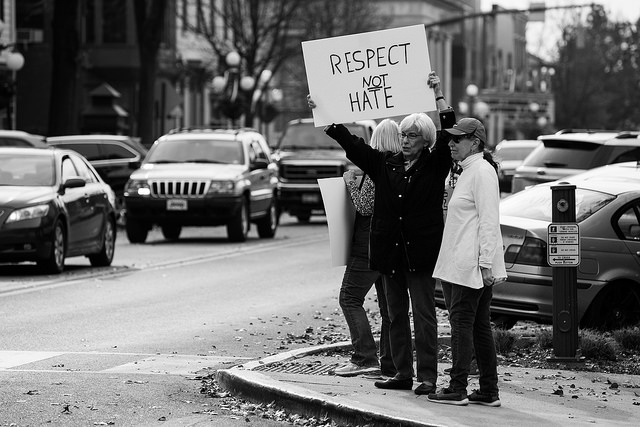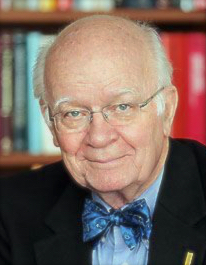The Religiocification of Hate
Sightings was born as an endeavor to discover and comment on the traces of “religion” which supposedly survive in a “secular” society
 Sightings was born as an endeavor to discover and comment on the traces of “religion” which supposedly survive in a “secular” society. However, instead of sighting only such presumed distant, obscure, or minuscule traces, our authors have often had to deal with the blinding flashes which many forms of religion cast in our societies. Not that these thunder and blaze only within religious institutions. We find them barnacled to events, causes, and appeals that show up in the 2016 worlds of politics, entertainment, and commerce. We once heard of a preacher who talked about “religiocification.” So…
Sightings was born as an endeavor to discover and comment on the traces of “religion” which supposedly survive in a “secular” society. However, instead of sighting only such presumed distant, obscure, or minuscule traces, our authors have often had to deal with the blinding flashes which many forms of religion cast in our societies. Not that these thunder and blaze only within religious institutions. We find them barnacled to events, causes, and appeals that show up in the 2016 worlds of politics, entertainment, and commerce. We once heard of a preacher who talked about “religiocification.” So…
It’s that time of year when communicators in our business (!) are busy naming the top 10 religious trends or events or phenomena of the year. We hereby nominate 2016 as the year in which the “religiocification of hate” was more visible, patent, and dangerous than in any other year in decades. For the second time in this year of hatreds—and the third in 15 months—we quote Else Frenkel-Brunswick, specialist on the “ethnocentric personality,” who observed that in the case of the hater, “even his hate is mobile and can be directed from one object to another”; and John Dewey, who noted that people “do not shoot because targets exist, but they set up targets in order that throwing and shooting may be more effective and significant.”
Today’s Sightings draws upon last week’s report of a Pew Research Center survey identifying the targets of the most “discrimination” (which in most cases is based in, related to, or magnified by “hate”) in the United States. Pew notes that 82% of polled Americans think that Muslims are the most targeted victims of discrimination, with 57% saying they face “a lot” of discrimination, up 12% since 2013. They passed up blacks, LGBTs, Jews—and, oh, yes, evangelicals (?)—as those who suffer the most discrimination. It’s an ever-changing scene; yes, “hate is mobile”—and portable.
One might wish or hope that religion and religions would help turn away haters and counter hate, but just the opposite is visible. “Hate” and group animosities show up on the first pages of the Hebrew Scriptures/Bible, as they do in most holy books of faith communities. Almost all of these texts also propose, envision, or command the pursuit of ways for love and understanding to counter hate—and for, say, “acceptance” to win over “discrimination.” But 2016 was not the year to see much of that, despite some good efforts by Pope Francis and many less well-known charismatic, courageous, and tireless leaders and ordinary folk in their faith communities.
A quick test of how vividly “discrimination” shades into “hate”? Hit the attached link for a report of Pew’s findings and there read, if you can bear it, some of the several hundred responses. In this case, most of the fury, obscenity, and un-understanding is directed at Islam, because Muslims were the lead subjects in the news-making survey.
We cannot end this issue of Sightings merely on a low and negative point. It is also important to see how citizens can turn from their hate-mobiles. Again, not for the first time this year do we quote philosopher Max Scheler, and what I call his “Three Alases.” When things are bad because of the evil in our heritages, he counsels, we can say, “Alas! What did our ancestors do?” It’s important to know that, but we can’t change the past. Scheler’s second one is, “Alas! What have I done?” But that, too, refers to an unchangeable past. The third one, however, looks to the personal, to the present, and to the future: “Alas! What kind of person am I that I am capable of hating other groups?” That question, says Scheler, may lead to a “change of heart,” and a better future. End of sermon. Forward to 2017.
Resources
- Harvard, Sarah. “Americans believe Muslims face the most discrimination in the US, new survey says.” Mic. Reposted with comments at AOL.com. December 9, 2016.
- Marty, Martin E. “Georgetown.” Sightings. June 6, 2016.
- —. “Hate Is Mobile.” Sightings. June 20, 2016.
- —. “Muslims in the South.” Sightings. October 5, 2015.
 Author, Martin E. Marty, is the Fairfax M. Cone Distinguished Service Professor Emeritus of the History of Modern Christianity at the University of Chicago Divinity School. His biography, publications, and contact information can be found at www.memarty.com. Author, Martin E. Marty, is the Fairfax M. Cone Distinguished Service Professor Emeritus of the History of Modern Christianity at the University of Chicago Divinity School. His biography, publications, and contact information can be found at www.memarty.com. |
Sightings is edited by Brett Colasacco, a PhD candidate in Religion, Literature, and Visual Culture at the University of Chicago Divinity School. Click here to subscribe to Sightings as a twice-weekly email. You can also follow us on Twitter.


